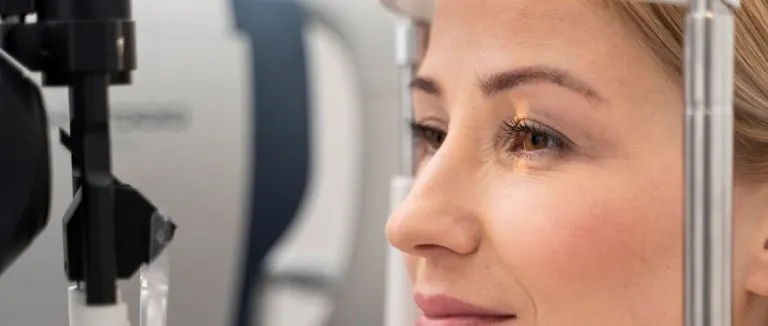Retina Surgery (Vitrectomy), What Is It? Symptoms of Retinal Disease
-
What is the Retina?
-
Symptoms of Retinal Disease
-
What Are Retinal Diseases?
-
What is Retinal Detachment?
-
What is Age-Related Macular Degeneration (AMD)?
-
When Is Retina Surgery (Vitrectomy) Recommended?
-
How Is Retina Surgery (Vitrectomy) Performed?
-
Precautions Before Retinal Surgery (Vitrectomy)
-
Postoperative Precautions After Retinal Surgery (Vitrectomy)
Retina surgery, or vitrectomy, is a surgical procedure performed to remove the vitreous gel-like fluid inside the eye or to correct problems on the retina. This procedure is conducted to treat retinal tears, detachments, or other retina issues.

What is the Retina?
The retina can be described as the sensory layer located at the back of the eye that enables vision. It lies at the furthest back of the eye chamber and consists of billions of visual cells and nerve fibers. After images focus on the retina, they are transmitted to the brain via nerve cells, where they are interpreted, leading to vision. The retina receives light passing through the front of the eye, the cornea, and the intraocular lens, transmitting this light to nerve cells to be sent to the brain. The retina is the final stage of the visual process, transforming images into interpretable signals in the brain.

Symptoms of Retinal Disease
The symptoms of retinal diseases can vary depending on the type and severity of the condition. These symptoms can vary from person to person but generally include:
- Sudden and persistent floaters
- Decreased or blurry vision
- Vision loss or the appearance of dark spots
- Distorted or wavy vision
- Objects appearing larger or smaller than normal
- Seeing floaters or spots in front of the eyes
These symptoms can manifest in retinal conditions such as retinal tears, retinal detachment, macular holes, age-related macular degeneration (AMD), and retinitis pigmentosa (night blindness).
What Are Retinal Diseases?
- Retinal Detachment
- Bleeding, edema, and detachment due to vascular diseases of the retina such as diabetes and hypertension
- Macular Hole
- Epiretinal Membrane
- Age-Related Macular Degeneration (AMD)
- Retinal Damage Due to Eye Trauma
What is Retinal Detachment?
Retinal tears lead to a condition called retinal detachment. Without treatment, detachment can result in permanent vision loss.
About 50% of patients notice flashes of light. These flashes are described as flashbulbs or lightning bolts. Black or red flying spots are observed. A dark curtain starting from the detached retina area gradually covers the entire eye, and when the central part of the eye is affected, the patient becomes unable to see anything.
At least 60% of patients experience the following symptoms during retinal tear formation:
- Flashes of light
- Sudden complaints such as seeing flies or spiders
When these complaints occur, a fundus examination is necessary. Laser treatment performed when a retinal tear occurs can prevent the development of retinal detachment. However, in some patients, retinal detachment occurs despite laser treatment.
In 40% of cases, detachment-related loss of visual field occurs without any symptoms.
The primary goal of surgical treatment is to stop the fluid passing through the tear by blocking the tear. Pumping by the pigment epithelium ensures the settling of the retina. This can be achieved in many ways.
What is Age-Related Macular Degeneration (AMD)?
It is the leading cause of vision loss in individuals over 50 in developed countries. It involves progressive damage to the macula, the central yellow spot of the light-sensitive nerve layer of the eye, along with the underlying pigment and vascular layers.
It may not present symptoms in early stages, hence regular check-ups are crucial. In later stages, symptoms such as:
- Distorted lines
- Decreased color vibrancy
- Seeing objects smaller than they are
- Advanced stages lead to decreased central vision; reading and facial recognition become difficult.
While not fully understood, risk factors include:
- Age (the strongest factor)
- Family history of AMD
- Caucasian race
- Smoking
- Female gender
- High blood pressure
- High cholesterol
- Light eye color
- Sun exposure
- Myopia
- Low fish consumption
- Cardiovascular diseases
There are two main types: wet and dry. In the early stages of dry AMD, yellow deposits accumulate under the macula, and changes occur in pigment cells. In wet AMD, abnormal blood vessels grow underneath the macula, leading to leakage or bleeding in advanced stages. In dry AMD, there is a loss of cells in the retina and underlying tissues.
Although scientific studies continue for dry AMD, there is currently no proven effective treatment method. However, a combination containing Lutein, Zeaxanthin, vitamins C and E, zinc, and omega-3 has been shown to slow down the progression from moderate to advanced stages. For wet AMD, although various treatment methods have been applied in the past (laser, photodynamic therapy), the current method involves injecting anti-VEGF drugs into the eye. These drugs can be administered in various ways, with the number of applications ranging from 3 to 12 per year. While visual improvement can be achieved, the primary aim is to preserve existing vision.
AMD is not a completely blinding disease. Depending on the level of vision loss, patients can be aided with high-powered reading glasses, magnifiers, or telescopic glasses.
When Is Retina Surgery (Vitrectomy) Recommended?
Retina surgery (vitrectomy) is a surgical procedure performed to remove the transparent gel called vitreous from the back cavity of the eye and to repair damage occurring on the retina. Retinal surgery may be recommended in the following cases:
- Retinal tear or detachment: Retinal detachment occurs when the retina separates from the inner wall of the eye globe. Retinal tear or detachment can lead to sudden vision loss. Vitrectomy is performed to prevent or repair retinal detachment.
- Diabetic retinopathy: Damage occurs in the blood vessels of the retina in individuals with diabetes. This damage can lead to vision loss and blindness. Vitrectomy can help improve vision loss caused by diabetic retinopathy.
- Retinal bleeding: When bleeding occurs in the retina, a blood clot can form behind the retina. This blood clot can cause vision loss. Vitrectomy can help improve vision loss caused by retinal bleeding.
- Macular hole: The macula is the central area of the retina responsible for detailed vision. Macular hole is characterized by a hole forming in the center of the macula. Vitrectomy can help improve vision loss caused by macular hole.
- Intraocular foreign body: When a foreign object enters the eye, it can damage the retina. Vitrectomy can remove the foreign body from the eye and repair the retina.
How Is Retina Surgery (Vitrectomy) Performed?
Retina surgery or vitrectomy is an intraocular surgical procedure usually performed under local or general anesthesia. The procedure is performed by entering the eye through the back of the white and colored part (sclera) of the eye rather than the front. Initially, anesthesia is applied to the surface of the eye, and the vitreous gel inside the eye is removed under a microscope. This step is used in the treatment of diseases requiring the removal of the vitreous due to various reasons. Subsequently, other surgical procedures necessary to correct problems on the retina are performed, such as repairing retinal tears or closing macular holes. After the procedure, a special gas or oil is injected instead of fluid, and the surface of the eye is closed. The healing process and outcomes can vary depending on the patient's condition and the procedure performed.
Precautions Before Retinal Surgery (Vitrectomy)
Retinal surgery (vitrectomy) is a procedure performed to remove the transparent gel called vitreous gel from the back cavity of the eye and repair damage to the retina. Vitrectomy surgery is usually performed under local anesthesia and takes approximately 1-2 hours. Patients are typically discharged on the same day after the surgery.
Here are some precautions to take before vitrectomy surgery:
- Follow your doctor's instructions: Before the surgery, your eye doctor may prescribe eye drops or medication for you.
- Come on an empty stomach: Refrain from eating or drinking for at least 8 hours before the surgery.
- Inform about all medications and supplements you're taking: Some medications or supplements may affect the effectiveness of the surgery.
- Protect your eyes: After the surgery, you may need to wear a bandage or goggles over your eyes.
Other precautions to take before vitrectomy surgery include:
- If you have diabetes, keep your blood sugar levels under control.
- If you are using blood thinners, consult your doctor before the surgery.
- After the surgery, rest adequately for the healing of your eyes.
Vitrectomy surgery is a highly effective method in the treatment of retinal diseases. However, like any surgical procedure, vitrectomy surgery also carries some risks. These risks include infection, bleeding, and loss of vision.
Postoperative Precautions After Retinal Surgery (Vitrectomy)
Using eye drops or medications regularly, wearing sunglasses to reduce sensitivity to light, and protecting the eyes are critical to reducing the risk of infection. Avoid excessive physical activity and lying face down for several days after the surgery. Regular postoperative check-ups should be followed, and any discomfort or abnormality should be reported to the doctor immediately. Smokers should quit smoking to support eye healing. It's important to remember that each patient may heal differently, so it's crucial to follow the doctor's recommendations and care instructions.
Frequently Asked Questions
The retina is a sensitive layer located inside the eye, and when it is damaged by high blood sugar levels, this condition is called "diabetic retinopathy." Diabetic retinopathy can cause damage to the retina by affecting the blood vessels inside the eye. This resulting retina damage can lead to visual problems. Symptoms may include blurry or distorted vision, spots, dots, or flashes of light in vision, and macular edema (central vision loss). If diabetic retinopathy is left untreated, it can progress and lead to severe vision loss or even permanent blindness. Therefore, it is important for diabetic patients to undergo regular eye examinations and keep their blood sugar levels under control.
When the retina is damaged, various eye health issues can arise. Particularly when the retina is damaged due to diabetes or other retinal diseases, this condition can lead to vision loss. Conditions resulting from retina damage include diabetic retinopathy, macular degeneration, retinal tear or detachment, retinitis pigmentosa, and more. These conditions can cause various symptoms such as blurred vision, perception of spots or lines, changes in color perception, dark spots, or visual field defects.
* Contents of this page is for informational purposes only. Please consult your doctor for diagnosis and treatment. The content of this page does not include information on medicinal health care at Liv Hospital








